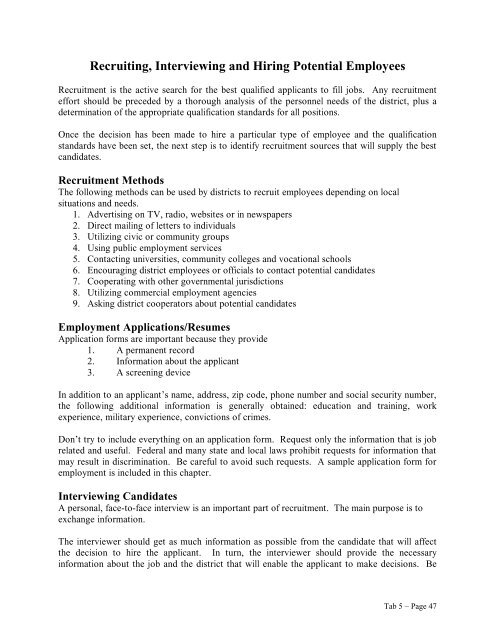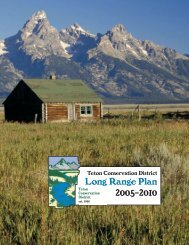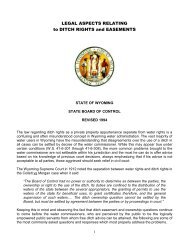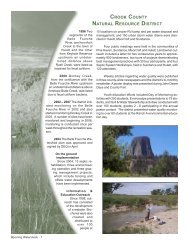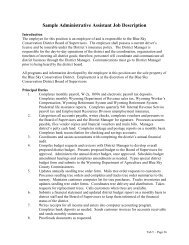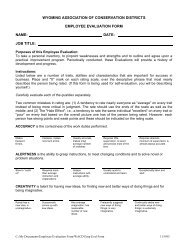Recruiting, Interviewing and Hiring Potential Employees
Recruiting, Interviewing and Hiring Potential Employees
Recruiting, Interviewing and Hiring Potential Employees
You also want an ePaper? Increase the reach of your titles
YUMPU automatically turns print PDFs into web optimized ePapers that Google loves.
<strong>Recruiting</strong>, <strong>Interviewing</strong> <strong>and</strong> <strong>Hiring</strong> <strong>Potential</strong> <strong>Employees</strong><br />
Recruitment is the active search for the best qualified applicants to fill jobs. Any recruitment<br />
effort should be preceded by a thorough analysis of the personnel needs of the district, plus a<br />
determination of the appropriate qualification st<strong>and</strong>ards for all positions.<br />
Once the decision has been made to hire a particular type of employee <strong>and</strong> the qualification<br />
st<strong>and</strong>ards have been set, the next step is to identify recruitment sources that will supply the best<br />
c<strong>and</strong>idates.<br />
Recruitment Methods<br />
The following methods can be used by districts to recruit employees depending on local<br />
situations <strong>and</strong> needs.<br />
1. Advertising on TV, radio, websites or in newspapers<br />
2. Direct mailing of letters to individuals<br />
3. Utilizing civic or community groups<br />
4. Using public employment services<br />
5. Contacting universities, community colleges <strong>and</strong> vocational schools<br />
6. Encouraging district employees or officials to contact potential c<strong>and</strong>idates<br />
7. Cooperating with other governmental jurisdictions<br />
8. Utilizing commercial employment agencies<br />
9. Asking district cooperators about potential c<strong>and</strong>idates<br />
Employment Applications/Resumes<br />
Application forms are important because they provide<br />
1. A permanent record<br />
2. Information about the applicant<br />
3. A screening device<br />
In addition to an applicant’s name, address, zip code, phone number <strong>and</strong> social security number,<br />
the following additional information is generally obtained: education <strong>and</strong> training, work<br />
experience, military experience, convictions of crimes.<br />
Don’t try to include everything on an application form. Request only the information that is job<br />
related <strong>and</strong> useful. Federal <strong>and</strong> many state <strong>and</strong> local laws prohibit requests for information that<br />
may result in discrimination. Be careful to avoid such requests. A sample application form for<br />
employment is included in this chapter.<br />
<strong>Interviewing</strong> C<strong>and</strong>idates<br />
A personal, face-to-face interview is an important part of recruitment. The main purpose is to<br />
exchange information.<br />
The interviewer should get as much information as possible from the c<strong>and</strong>idate that will affect<br />
the decision to hire the applicant. In turn, the interviewer should provide the necessary<br />
information about the job <strong>and</strong> the district that will enable the applicant to make decisions. Be<br />
Tab 5 – Page 47
honest. Do not leave the person with any false impressions about the duties, the pay, the<br />
advancement possibilities, etc. of the position.<br />
Conducting the Interview<br />
1. Encourage the applicant to talk. Ask a good lead off question such as “Tell me<br />
about your last job.”<br />
2. Ask “tell me” questions that will allow for more complete answers, as opposed to<br />
asking yes or no questions.<br />
3. Avoid controversy. Don’t interrupt the applicant. Avoid putting the applicant on<br />
the defensive by arguing or displaying authority.<br />
4. Avoid leading questions, such as “Doesn’t your present job call for considerable<br />
planning?” Instead ask, “What planning responsibilities do you have in your<br />
present job?”<br />
5. Take notes.<br />
6. Give the applicant an opportunity to ask questions about district employment.<br />
7. Be objective in your evaluation.<br />
Application forms <strong>and</strong> interview questions should not violate the Civil Rights Act. The<br />
following list covers what questions may be asked, <strong>and</strong> those which if asked, might be<br />
considered a violation.<br />
Name<br />
Arrests<br />
Address<br />
Birth Place/Ancestry<br />
APPROPRIATE<br />
Ask applicant for other names under<br />
which employed or educated (for<br />
reference checking purposes only).<br />
Ask if applicant has been convicted<br />
of a crime, <strong>and</strong> if so, for details.<br />
Indicate that this is not an automatic<br />
bar to employment.<br />
Ask applicant for address. Tell<br />
applicant of district continuing<br />
residency requirements, if any.<br />
QUESTIONABLE<br />
Ask applicant for maiden name,<br />
previous names, names of<br />
relatives, etc.<br />
Ask if applicant has ever been<br />
arrested.<br />
Limit geographical area in<br />
accepting application.<br />
Ask applicant for birth place of self<br />
or relative.<br />
Age<br />
Ask applicant age if for bona fide<br />
occupational qualification or<br />
minimum age laws.<br />
Religion Tell applicant the workweek<br />
requirements<br />
Race/Color<br />
Tell applicant a photograph may be<br />
required after hiring<br />
APPROPRIATE<br />
Ask applicant to disclose ancestry<br />
or national origin.<br />
Ask applicant age.<br />
Ask applicant for any information<br />
regarding religion, creed, holidays,<br />
preferences).<br />
Ask applicant for photograph<br />
before hiring.<br />
Ask applicant for eye or hair color.<br />
QUESTIONABLE<br />
Tab 5 – Page 48
Citizenship<br />
Education or<br />
Experience<br />
Relatives<br />
Ask if applicant is a U.S. citizen or<br />
intends to become one.<br />
Ask applicant about education <strong>and</strong><br />
work experience<br />
Ask applicant if any relatives are<br />
currently employed by district<br />
Ask applicant if self or relatives<br />
are naturalized or native-born<br />
citizens or request citizenship<br />
dates.<br />
Ask applicant in what country<br />
attended school.<br />
Ask for names names <strong>and</strong><br />
addresses of relatives to be notified<br />
in case of emergency.<br />
Military Ask applicant about military<br />
experience in the U.S. Armed<br />
Forces or State Militia.<br />
Memberships<br />
Sex<br />
Child Care<br />
Marital<br />
Saturday/Sunday<br />
Work<br />
Height/Weight<br />
Ask applicant about membership in<br />
organizations which do not disclose<br />
race, religion, or national origin<br />
Ask if applicant belongs to an<br />
organization which advocates the<br />
violent overthrow of the U.S.<br />
government.<br />
Tell applicant that job involves<br />
work on these days <strong>and</strong> that a<br />
reasonable effort will be made to<br />
accommodate the religious needs.<br />
Ask a male applicant the maiden<br />
name of wife or mother.<br />
Ask applicant about foreign<br />
military.<br />
Ask applicant to produce military<br />
discharge papers before hiring.<br />
Ask applicant about membership in<br />
organizations which would<br />
indicate religion, race or national<br />
origin.<br />
Ask applicant to indicate sex,<br />
unless when it is a bona fide<br />
occupational qualification, i.e.<br />
washroom attendant, etc.<br />
Ask applicant about child care<br />
arrangements.<br />
Ask applicant about marital status,<br />
spouse’s name or occupation, prior<br />
married name, Mr., Mrs., etc.<br />
Ask applicant about height <strong>and</strong><br />
weight, unless bona fide<br />
occupational qualification.<br />
Salary<br />
Ask applicant for salary desired, or<br />
salary history.<br />
Ask applicant for lowest salary<br />
acceptable.<br />
Credit Ask applicant for credit<br />
information (charge accounts,<br />
home ownership).<br />
Tab 5 – Page 49
Types of employment<br />
The following definitions or classifications may be useful to districts in setting policy. They may<br />
be modified to fit a particular district’s needs.<br />
Permanent full-time employee. An employee who has been hired to fill a continuing position<br />
requiring a minimum of 40 hours per week or work <strong>and</strong> who has successfully completed a<br />
probationary period. The employee is entitled to all fringe benefits.<br />
Permanent part-time employee. An employee who has been hired to fill a continuing position<br />
requiring less than 40 hours of work per week on a regular <strong>and</strong> recurring schedule <strong>and</strong> who has<br />
successfully completed a probationary period. The employee may be entitled to fringe benefits<br />
on a pro-rated basis.<br />
Temporary employee. An employee who has been hired to fill a position of limited duration,<br />
serves no probationary period, is paid an hourly wage for the hours actually worked <strong>and</strong> receives<br />
benefits at the board’s discretion.<br />
Equal Employment Opportunity<br />
In passing the Civil Rights Act of 1964, Congress established as a compelling national priority<br />
that discrimination in employment be eliminated. As a public employer, districts are responsible<br />
for insuring that discrimination on the basis of race, color, national origin, age, religion or sex<br />
does not occur in any aspect of employment, including advertising, recruitment, referrals, testing,<br />
hiring, assignment, transfer, promotion, training, apprenticeship, disciplinary action, layoff <strong>and</strong><br />
recall, termination, compensation, benefits <strong>and</strong> all other terms, conditions, <strong>and</strong> privileges of<br />
employment.<br />
A h<strong>and</strong>book for state, county <strong>and</strong> municipal governments regarding their responsibilities in the<br />
area of equal employment opportunity can be downloaded from the Department of Labor at<br />
http://www.dol.gov/asp/programs/EmpLawGuideFINAL.pdf<br />
Political Participation (Hatch Act)<br />
Federal law prohibits certain partisan political activity by an officer or employee of a State or<br />
local agency under some circumstances. The law is enforced by the Merit Systems Protection<br />
Board of the Federal Government.<br />
Don’t rely on the advice of friends, fellow workers or others who may not have special<br />
knowledge of the law. Section 1502 (a) of title 5, United States Code, commonly referred to as<br />
the Hatch Act, places certain restrictions on political activity of individuals employed by a State<br />
or local agency whose principal employment is in connection with an activity which is financed<br />
in whole or in part by loans or grants, other than revenue sharing funds, made by the United<br />
States or a Federal agency. “State or local agency” means the executive branch of a State,<br />
municipality, county or other political subdivision of a State, or Agency or Department thereof.<br />
Tab 5 – Page 50
Covered state of local agency employees may:<br />
? Run for public office in nonpartisan elections<br />
? campaign for <strong>and</strong> hold office in political clubs <strong>and</strong> organizations<br />
? actively campaign for c<strong>and</strong>idates for public office in partisan <strong>and</strong> nonpartisan elections<br />
? contribute money to political organizations <strong>and</strong> attend political fundraising functions<br />
Covered state <strong>and</strong> local employees may not-<br />
? be c<strong>and</strong>idates for public office in a partisan election<br />
? use official authority or influence to interfere with or affect the results of an election or<br />
nomination<br />
? directly or indirectly coerce contributions from subordinates in support of a political party<br />
or c<strong>and</strong>idate<br />
Penalties for Violating the Hatch Act<br />
If the Merit Systems Protection Board finds that the violation warrants dismissal from<br />
employment, the employing agency must either remove the employee or forfeit a portion of the<br />
federal assistance equal to two years salary of the employee. If the Board finds the violation<br />
does not warrant the employee's removal, no penalty is imposed.<br />
Visit the U.S. Office of Special Counsel – Hatch Act website, located at<br />
http://www.osc.gov/ha_state.htm for more information.<br />
Tab 5 – Page 51


